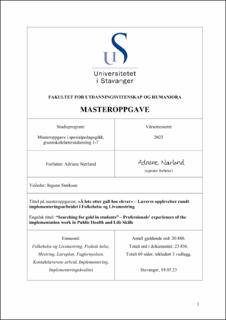| dc.contributor.advisor | Størksen, Ingunn | |
| dc.contributor.author | Nærland, Adriane | |
| dc.date.accessioned | 2023-09-14T15:51:12Z | |
| dc.date.available | 2023-09-14T15:51:12Z | |
| dc.date.issued | 2023 | |
| dc.identifier | no.uis:inspera:146807277:34490768 | |
| dc.identifier.uri | https://hdl.handle.net/11250/3089544 | |
| dc.description.abstract | På grunn av den nye læreplanen, Fagfornyelsen 2020, kunne det være interessant å se på hvordan deler av læreplanen ble implementert i skolehverdagen. Denne studien har derfor tatt for seg problemstillingen «Hvordan implementeres folkehelse og livsmestring for elever på 1. trinn?». Det ble også stilt to forskningsspørsmål: «Oppleves det tverrfaglige temaet folkehelse og livsmestring aktuelt for elevene på første trinn?» og «Hvordan implementeres de aktuelle områdene i først trinn, og hvilke områder vektlegges?». For å svare på spørsmålene har det blitt presentert relevant teori rundt folkehelse og livsmestring, og mestringsteorier – blant annet Lazarus sin «coping»-teori. Det var også relevant å se på teori knyttet opp mot lærerens arbeid med livsmestring, og rundt implementeringsarbeid. Dette er en kvalitativ studie, hvor fem informanter deltok i personlige, semistrukturerte intervjuer. For å kunne bearbeide datamaterialet som kom fra intervjuene, brukte jeg analysemetoden Interpretative Phenomenological Analysis (IPA). Jeg tok for meg analysens seks steg, og analyserte informantenes opplevelser og erfaringer rundt implementeringsarbeidet.
Resultatene viste flere strategier for å implementere det tverrfaglige temaet folkehelse og livsmestring på 1. trinn, og materialet ble delt opp i fire kategorier: 1) Tidsbruk, 2) Forståelser av temaene folkehelse og livsmestring, 3) Bruk av livsmestringsprogram og 4) Varierende implementering. Resultatene ble presentert i en modell, og diskutert om hverandre. Konklusjonen i studiet er at implementeringen av folkehelse og livsmestring på 1. trinn, virker varierende. Meningene til informantene virker splittet rundt de aktuelle områdene innenfor folkehelse og livsmestring, samtidig som at fysisk og psykisk helse er det temaet som vektlegges mest. Det konkluderes også med at folkehelse og livsmestring oppleves aktuelt for elever på første trinn. Dette til tross for at lærere opplever en manglende støtte og veiledning hos skoleledelsen, både underveis og i etterkant av implementeringsarbeidet rundt Fagfornyelsen.
"Det å se at elevene mestrer livet, at de fungerer og klarer kle av og på seg, følge regler og forstår beskjedene. Jeg tenker det viktigste vi lærere gjør er å lete etter gullet i barna, slik at de selv forstår seg som verdifulle" (Informant 5). | |
| dc.description.abstract | Due to the new curriculum, Fagfornyelsen 2020, it could be interesting to see how parts of the curriculum were implemented in school. This study has therefore addressed the problem "How are public health and life skills implemented for pupils in the 1st grade?". Two research questions were also asked: "Do the interdisciplinary topics of public health and life skills feel relevant to students in the 1st grade?" and "How are the relevant areas implemented in the 1st grade, and which areas are emphasised?". In order to answer the questions, relevant theory has been presented around public health and life skills, and coping theories - including Lazarus's "coping" theory. It was also relevant to look at theory linked to the teacher's work with life skills, and around implementation work. This is a qualitative study, where five informants participated in personal, semi-structured interviews. In order to be able to process the data material that came from the interviews, I used the analytical method Interpretative Phenomenological Analysis (IPA). I considered the six steps of the analysis, and analyzed the experiences of the informants around the implementation work.
The results showed several strategies for implementing the interdisciplinary topic of public health and life skills in the 1st grade, and the material was divided into four categories: 1) Use of time, 2) Understandings of the topics of public health and life skills, 3) Use of life skills-program and 4) Varying implementation. The results were presented in a model and discussed with each other. The conclusion of the study is that the implementation of public health and life skills in the 1st grade seems to vary. The opinions of the informants seem divided around the relevant areas within public health and life skills, at the same time that physical and mental health is the theme that is most emphasized. It is also concluded that public health and life skills are perceived as relevant for pupils in the first grade. This is despite the fact that teachers experience a lack of support and guidance from the school management, both during and after the implementation work around the subject reform.
"Seeing that the students master life, that they function and are able to dress and undress, follow rules and understand the messages. I think the most important thing we teachers do is to seach for the gold in the students, so that they understand themselves as valuable" (Informant 5). | |
| dc.language | nob | |
| dc.publisher | uis | |
| dc.title | «Å lete etter gull hos elever» – Læreres opplevelser rundt implementeringsarbeidet i Folkehelse og Livsmestring | |
| dc.type | Master thesis | |
